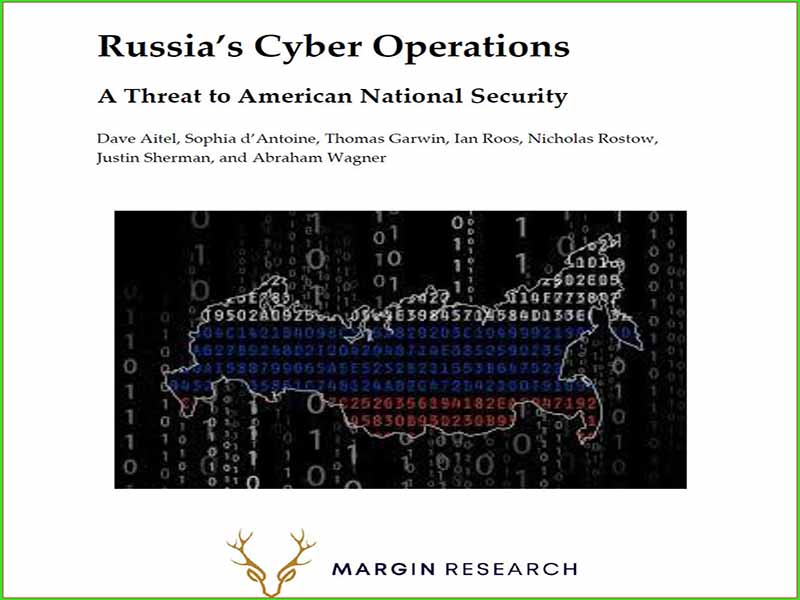- عنوان: Russia’s Cyber Operations / A Threat to American National Security
- نویسنده: Dave Aitel
- حوزه: عملیات سایبری
- سال انتشار: 2022
- تعداد صفحه: 119
- زبان اصلی: انگلیسی
- نوع فایل: pdf
- حجم فایل: 2.22 مگابایت
یک پروژه تحقیقاتی در دهه 1960 در آژانس پروژه های تحقیقاتی پیشرفته (ARPA) یک انقلاب فناوری را آغاز کرد که هرگز پیش بینی نمی شد و مهم ترین تغییر پارادایم از زمان اختراع تایپ متحرک بود. امروزه بیشتر عملیات ارتباطات و اطلاعات بر روی سیستم های متصل به زیرساخت اینترنت انجام می شود. وابستگی به این زیرساخت کاربران را در برابر حملات خصمانه شرکت های جنایتکار و سازمان های اطلاعاتی و نظامی خارجی آسیب پذیر می کند. روسیه بهعنوان یکی از مهمترین تهدیدها شناخته میشود، زیرا تواناییهای سایبری خود را در زمینه جمعآوری اطلاعات، جاسوسی و جنگ سایبری بهطور مستمر در این فعالیتها گسترش داده است.
نگاه روسیه به سایبر متفاوت از همتایان غربی خود است. رهبری روسیه خود را درگیر یک مبارزه مداوم و وجودی در هر حوزه، از جمله فضای اطلاعاتی میداند. مسکو اینترنت را تهدیدی برای امنیت رژیم و سلاحی برای استفاده علیه دشمنان روسیه میداند و از اصطلاح «سایبری» یا «جنگ سایبری» استفاده نمیکند مگر با اشاره به مفاهیم غربی، و ترجیح میدهد عملیات سایبری را در چارچوب گستردهتر ببیند. امنیت اطلاعات و جنگ اطلاعاتی این مفهوم کل نگر شامل عملیات شبکه کامپیوتری، جنگ الکترونیک، عملیات روانی و عملیات اطلاعاتی است. مطابق با تصورات شوروی مبنی بر مبارزه با تهدیدات جاری از خارج و داخل، رژیم کنونی روسیه مبارزه بر سر «فضای اطلاعاتی» را پایان ناپذیر می داند.
عملیات سایبری تهاجمی نقش بزرگ و فزاینده ای در عملیات نظامی روسیه و در چارچوب بازدارندگی استراتژیک روسیه ایفا می کند. در حالی که به دلایل ساختاری و اعتقادی، ارتش و سرویسهای اطلاعاتی روسیه در پذیرش عملیات سایبری کند بودند، دولت اکنون قصد دارد تواناییهای سایبری تهاجمی و دفاعی نیروهای مسلح و سایر نهادهای امنیتی را تقویت کند. از آنجایی که عملیات سایبری روسیه با سرعت و در مقیاسی فراتر از آنچه که به طور گسترده گزارش شده است، رشد می کند، فرصت بسیار خوبی برای استفاده از اطلاعات و داده های منبع باز برای درک ماهیت این عملیات و تهدیدی که ایجاد می کند، وجود دارد.
هدف اصلی برنامه DARPA Social Cyber استفاده از یک رویکرد جامع برای درک فرهنگ و انسان شناسی فرآیند توسعه نرم افزار با توجه به کدهای مخرب و نرم افزار منبع باز (OSS) است. تهدیدات سایبری و اجزای عملیاتی روسیه در برابر شناسایی با روشهای اطلاعاتی سنتی مقاومت نشان دادهاند: دادههای منبع بخشی از رژیم معمول جمعآوری نیستند و ابزارهای تحلیلی هوش مصنوعی، مانند آنهایی که برای این مطالعه استفاده شدهاند، بر تلاشهای توسعه نرمافزار اصلی تکیه میکنند. برنامه دارپا تحلیل حاضر به چگونگی توزیع کدهای مخرب می پردازد. ابزارهای هوش مصنوعی مواد منبع باز را جستجو می کنند و داده های به دست آمده را استخراج و تجزیه و تحلیل می کنند.
A 1960s research project at the Advanced Research Projects Agency (ARPA) began a technology revolution never anticipated and the most significant paradigm change since the invention of movable type. Today, most communications and information operations take place on systems connected to the Internet infrastructure. Dependence on this infrastructure makes users vulnerable to hostile attacks by criminal enterprises and foreign intelligence and military organizations. Russia stands out as one of the most significant threats, having greatly expanded its cyber capabilities with respect to intelligence collection, espionage, and cyber warfare as it engages in these activities on a continuing basis.
Russia views cyber differently than its western counterparts. Russia’s leadership sees itself as engaged in an ongoing, existential struggle in every realm, including the information space. Moscow views the Internet as a threat to regime security and a weapon to be used against Russia’s enemies and does not use the term “cyber” or “cyber warfare” except in reference to Western concepts, preferring to see cyber operations in the broader framework of information security and information warfare. This holistic concept includes computer network operations, electronic warfare, psychological operations, and information operations. Consistent with Soviet notions of combating ongoing threats from abroad and within, the present Russian regime views the struggle over “information space” as unending.
Offensive cyber operations play a large and increasing role in Russian military operations and in Russia’s strategic deterrence framework. While, for structural and doctrinal reasons, the Russian military and intelligence services were slow to embrace cyber operations, the government now plans to bolster the offensive and defensive cyber capabilities of the armed forces and other security institutions. As Russia’s cyber operations grow at a pace and on a scale well beyond what has been widely reported, there is a great opportunity to use open-source information and data to understand the nature of these operations and the threat they constitute.
A central objective of the DARPA Social Cyber program is to utilize a comprehensive approach to understand the culture and the anthropology of the software development process with regard to malicious code and open-source software (OSS). Russia’s cyber threats and operational components have resisted identification by traditional intelligence methods: the source data is not part of the usual collection regime, and the AI analytical tools, such as those utilized for this study, rely on a major software development effort integral to the DARPA program. The present analysis looks at how malicious code is distributed; AI tools search open-source source materials and extract and analyze the data obtained.
این کتاب را میتوانید بصورت رایگان از لینک زیر دانلود نمایید.
Download: Russia’s Cyber Operations




































نظرات کاربران